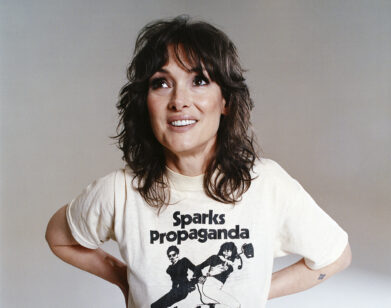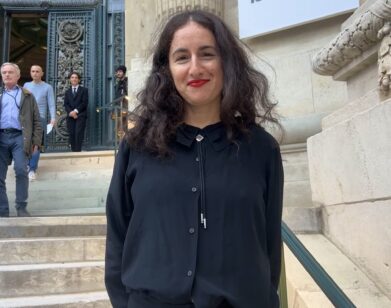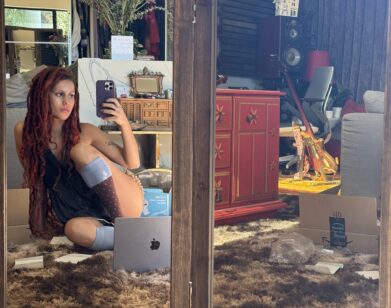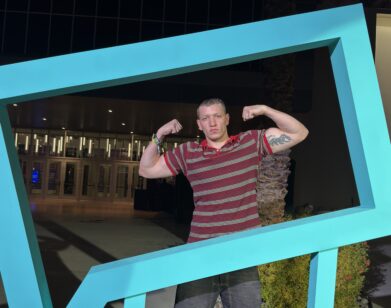Dylan Moran Makes Sentences of Things
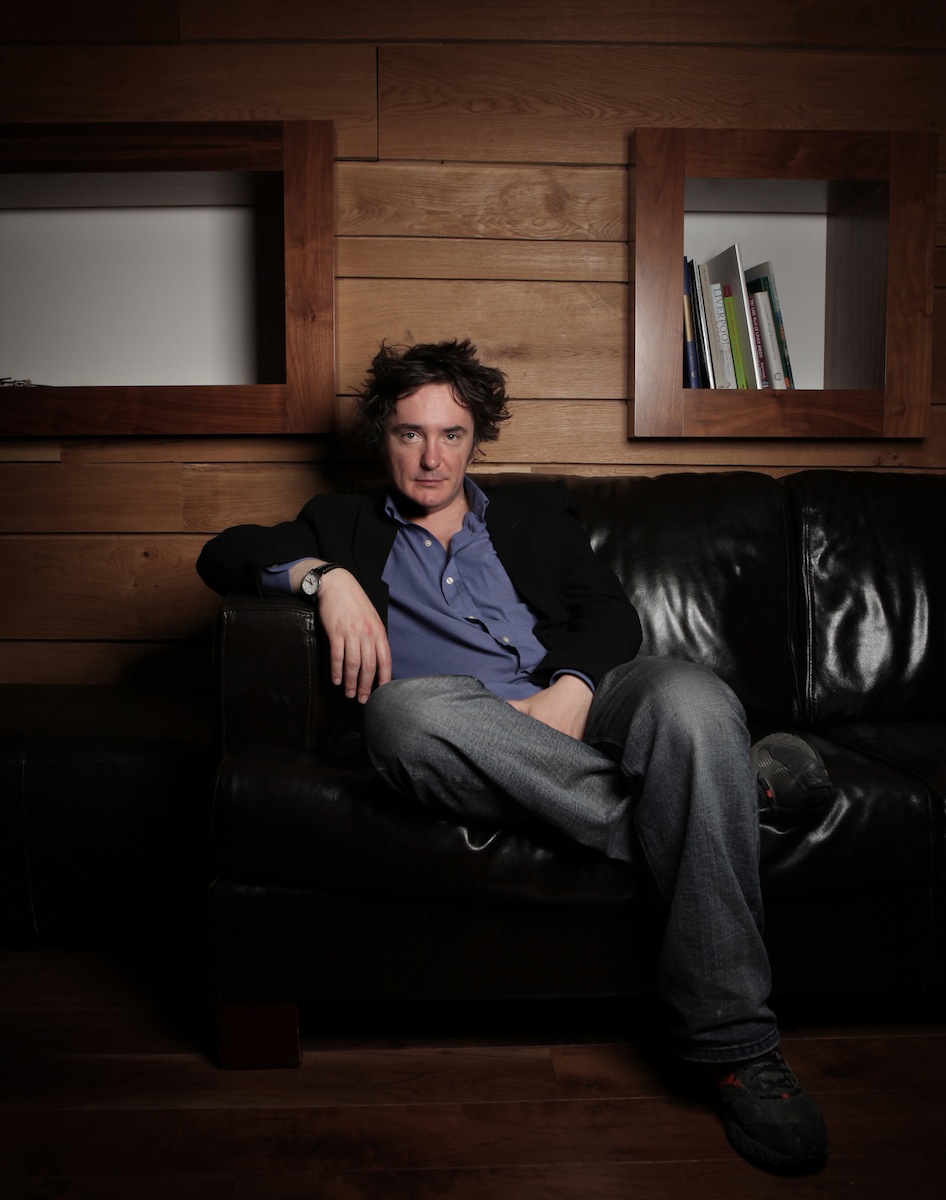
ABOVE: DYLAN MORAN. IMAGE COURTESY OF ANDY HOLLINGWORTH
The very mention of Irish comedian Dylan Moran’s name tends to evoke the image of Bernard Black, a character he so brilliantly portrayed on the popular U.K. television series Black Books. With a glass of red wine clumsily held in one hand and a cigarette in the other, Bernard Black had a disheveled mop of hair pointing in all directions and often shouted at customers to leave his book shop immediately. Remove the drunken mumblings and overtly sarcastic demeanor and you are left with a ramshackle appeal and sardonic wit authentic to Moran himself. Also, there are the books.
“I wish I had longer in each place so that I could find out more about it by talking to people,” he says of his upcoming trip to America. While growing up in Ireland, Moran was immersed in a world of language, an environment where words and banter took precedence over mundane distractions such as television. With an inquisitive nature and diverse arsenal of literary influences including S.J. Perelman and Samuel Beckett, Moran is a craftsman of words who possesses a true appreciation for conversation and the art of storytelling. He is able to look at life across familiar topics and, through his stand-up, share a bizarre and hilarious concoction of observation.
Le Monde once named him “the greatest comedian, living or dead,” and Moran is bringing his show Yeah, Yeah to North America this month after successful tours of the U.K., Australia, and Europe. We recently spoke to Moran about books, what makes people happy, and why it’s important to laugh.
J.L. SIRISUK: Where exactly are you right now?
DYLAN MORAN: I am in Newcastle.
SIRISUK: It’s very exciting that you’re coming to America soon. I think you’ll be here next week?
MORAN: I knew it was coming, but it’s come upon me all of a sudden. I’m in Newcastle doing a show to get myself ready. I’m doing a rock festival at the weekend, so I have to stand in front of a lot of people, and you know I’m not auteur as such. I’ve written a lot of new stuff for America, and I need any stage time I can get.
SIRISUK: Has your show changed very much since the last time you took it on the road, and what’s that process like?
MORAN: It has changed since last time. There may be some stuff that I’ll do again, depending on where I am, but I’m writing all the time. Actually, what I tend to do or what I’ve certainly done this time, is I sort of have a sea of material and I don’t know exactly what I’m going to do, and inevitably I’ll come off and think, “Oh I’m meant to do this,” or “I’m meant to do that” but I have too much deliberately so that I always have somewhere to go.
SIRISUK: Who are some of your earlier creative influences? They don’t necessarily have to be comedic ones, just people who sparked that interest in you to write.
MORAN: There’s lots and lots of people. I actually very rarely see comedy myself, and although I admire the work of some comics, it does come from all over, so I’ll get a charge out of some fiction writers and poets. There are some American poets I really like. There are two in particular that I’ve read a lot of recently—there’s Charles Simic and Frederick Seidel. Charles Simic is of Serbian origin, but he’s American and teaches at Cornell, I think. A terrific poet, he’s very funny. Frederick Seidel is from Baltimore originally; he’s a brilliant poet and can be very funny. A lot of the fiction I read growing up was post-war American, and not all of it centers on Manhattan, but around people of the Mad Men generation, people like John Cheever and, in more modern times, Don DeLillo, who I always mention. I love his work; and some of the old New Yorker writers like S. J. Perelman meant a lot to me when I was growing up. There’s European writers like the people Irish people always mention, like Beckett and Flann O’Brien; everybody knows them, so you grow up with those voices. I’m very drawn to Eastern Europe, so I like a Hungarian writer who wrote in French called Emil Cioran, he was always good for giving me such a stir.
SIRISUK: So much literary inspiration! I know in the past you had mentioned that you were writing a book, is this still something that interests you?
MORAN: I am working on a book, but I’ve got to get this live stuff done and then I can get back to my book. I’ve also written a couple of television pilots. I’m doing a couple of things all at once, but I will get my book out eventually.
SIRISUK: You’re working on so many different forms of writing—a book, the television pilot, and stand-up. Each can have its own constraints; for example, a pilot can only be so long. Do you feel that there is a particular outlet that allows you to express yourself the most?
MORAN: There are different forms, so you have to learn to enjoy the possibilities of all of them. You know, people sometimes say to me, “Do you prefer to do this or that, act or do stand-up or write,” but the thing that I enjoy most is the difference between all of them, because you’re always learning. I don’t go around thinking of myself as a great anything. [laughs] I’m actually lucky to have the chance to fail at all of them. “The perfect is the enemy of the good” is the old phrase. You’re not going to learn anything if you’re not prepared to go flat, so I’m very happy to go flat.
SIRISUK: I read in a previous interview that you couldn’t imagine having any other kind of job. Do you remember that moment in life when you realized just how important humor is to you?
MORAN: I don’t remember a time when it wasn’t. I grew up in a house where there was lots of teasing and language play and laughter; it was very important. When I was a teenager, you wouldn’t go to a bar and find lots of televisions everywhere. People were talking. Talk was the mental fire you would gather around in the evening. It occupied a big part of your existence. It’s not about sitting in front of the television, it’s what’s happening in the room.
SIRISUK: Lots of storytelling, it seems.
MORAN: That is kind of the international reputation. Sometimes it’s not storytelling so much as just banter or bullshit, you know.
SIRISUK: The sharing.
MORAN: It’s coffeehouse-ing, whatever you want to call it. But we did it a lot.
SIRISUK: Are you able to remember your very first stand-up experience and what that was like for you?
MORAN: I just went to a club, and it was much better than I thought it was going to be, and then I asked if could do five minutes next week and everybody was great, very generous and said, “Sure come along and do it,” and that was it. It really was that simple. I just took it from there, and I was back as soon as they would have me. Then I was on regularly, and I moved to London because we had one or two clubs in Dublin at the time, one of which would be open at any one time, the other one would always close and then re-open and then you go to London where there’s a hundred clubs.
SIRISUK: How did it feel?
MORAN: It felt good, you know, and to be honest with you, it sort of worked from the outset, and that’s really how it happened. I was nervous but not really embarrassed. It felt quite natural, to be honest with you.
SIRISUK: Earlier you mentioned a strong interest in Eastern Europe and its culture, and you’ve taken your show to Eastern Europe and even to Russia. When you were in those parts of the world, did you adapt your show or choose certain stories based on the culture you were entering?
MORAN: Sure, that’s what it’s about. I don’t just get off an airplane and do a set show. Like I just said to you, it’s all about talking and I have these wonderful friends in Russia and I’ll have hours and hours and hours of talking and finding out about the country, because all I had before I got there was reading or film. It’s all about finding out what’s going on. It’s an exchange, it’s a conversation. I can’t do the show without having had that conversation. It’s no different, really, from being in America. I’ve got my friends there that I work with, talk to people and find out what’s going on, how different groups feel about stuff in the news or what’s happening in the country or the world.
SIRISUK: So you’re constantly writing while moving from one place to another.
MORAN: Yeah, absolutely. You may have some parts that are like songs or set pieces that you hope that you can talk about. You know, the universal elements of human life on earth. Your kitchen, what happens in the kitchen, what happens in the bedroom, how you talk to your partner, how you talk to your children, how you talk to your friends. This is the same the world over, aspects are of it anyway.
SIRISUK: What do you feel that you get from touring, from sharing your stories and jokes with the world?
MORAN: Well, I find out more. I find out more about how everybody sees the positions that we’re in from the different stations on the earth. I’m always learning, the same things come up again and again about what it really is that matters to people. I was on a flight a couple years ago and there was a woman seated beside me, she was a psychologist, from this huge international survey as part of this team, I think it was from the U.N. With what they thought made people happy, almost everyone in the West said “your key relationships,” but because their surveys are so wide the thing that came out top was the ability to go and wash yourself and to be able to find water. So the same things come up for everybody from each country, the same concerns. Family, how your kids are doing, and then for people who are not so fortunate, it’s, “How am I going to be able to get food and can I get some water?” But I think everybody is gradually realizing that more and more, the extent of our luck.
SIRISUK: Why do you think it’s so important to laugh?
MORAN: There’s a number of ways to answer that. Physiologically it’s just important, it’s good for you. It depends on what you’re laughing at, though, I mean if you’re laughing at something to defend yourself from actually thinking about something properly, I would say it’s not good for you in the long run. You can see desperation in people who are too eager to laugh because they’re in such a hurry not to look at what’s confronting them in their lives and that’s kind of sad because there’s a kind of pornographic aspect to it, of making some sort of pain go away, of hovering around a pain, making yourself numb, not feel anything. But at the same time, what are you going do with the universal pain or anxiety? You can only have so much of that and then you kind of have to laugh.
DYLAN MORAN’S NORTH AMERICAN TOUR STARTS TODAY. HE WILL BE PERFORMING AT THE NYU SKIRBALL CENTER FOR THE PERFORMING ARTS ON JUNE 19. FOR MORE INFORMATION ON THE TOUR, PLEASE VISIT MORAN’S WEBSITE.

